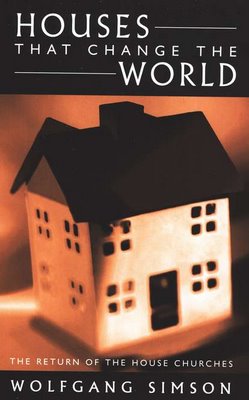 Hat tip to Leighton at TheHeresy for the heads up that now available online is Houses That Change the World by German author Wolfgang Simson.
Hat tip to Leighton at TheHeresy for the heads up that now available online is Houses That Change the World by German author Wolfgang Simson.For me, this book is very beloved. It holds a special place in my heart, particularly because it was the equivalent of that little red pill that Morpheus gave Neo in The Matrix. It was the apparatus that pulled out the last screw that finally brought down the walls of the church for me. Somehow, it was the thing that finally pulled me into the reality that church is not a place we go but a thing we are. That church isn’t a building or even the people identified with that building but the living-together-everyday as those who follow Jesus. I’d been coming to that point for many years. I’m not sure what it was about Houses that pushed me over the edge, but for some reason it did.
 Simson is one of many voices today—from evangelicals like George Barna to spiritual transformation sages like Dallas Willard and Richard Foster to emerging voices like Brian McLaren—who tell us that the church today isn’t what God wants it to be and that God is reforming us and his church is some radical ways. In the preface of Houses, Simson observes this:
Simson is one of many voices today—from evangelicals like George Barna to spiritual transformation sages like Dallas Willard and Richard Foster to emerging voices like Brian McLaren—who tell us that the church today isn’t what God wants it to be and that God is reforming us and his church is some radical ways. In the preface of Houses, Simson observes this:God is changing the church, and that, in turn, will change the world. Millions of Christians around the world are aware of an imminent reformation of global proportions. They are saying, in effect, ‘Church as we know it is prevents Church as God wants it.’ Amazingly, many are hearing God say the very same thing to them. There is a new collective awareness of an age-old revelation, a corporate spiritual echo.For Simson, this reformation (and a turning back to the early Church and her history) opens the door for the expression of church he dreams of, one that “is like a spiritual extended family—organic, not organized, relational, not formal.” For him that expression takes form in the house church.
While I’m really attracted to Simson’s expression, I must admit that I don’t think house churches are the answer. In fact, I’m coming to the conclusion that the Kingdom and life with and in Jesus isn’t about finding the right way to do church but living ever-more-deeply in Jesus and walking with those that God has put in our lives right now. What’s the difference? One is focused on trying to organize and institutionalize the Kingdom. The other is focused on setting it loose. Here’s how Wayne Jacobsen illustrates it in The Church that Jesus Builds:
Relational community is not rocket science. The more we try to organize it the more we will siphon the life right out of it. When I was in junior high school I watched my parents move from being nominal church attendees to passionate believers. Caught up in the early days of the Charismatic renewal of the mid-1960s they began to discover just how real Jesus wanted to be in their lives and found many of their friends shared that hunger. Without any of the hassles of an institution they met house-to-house, shared meals and resources, and even invited in more mature believers to help them make sense of what God was doing in them.Jacobsen is illustrating that when we become focused on finding the “right” way to do church, we miss Jesus. That’s not saying real living-and-growing-together can’t be experienced in the various forms of how we do church today. From the house church to the corner church to the coffee-house church to the mega-church (I attend one of these), we can find experiences of that growing-and-living-together Kingdom life. But, as those most-observant evangelical voices are pointing out, the vast majority of how we do church today isn’t transforming lives.
The congregation they all attended on Sunday mornings soon grew threatened by their newfound fervor and soon forced them out. Excited, they moved their Friday night ‘prayer meetings’ to Sunday mornings to ‘start their own church.’ I remember even as a young man being amazed at how quickly their joy, enthusiasm and spontaneity faded away in the demands of getting organized, planning Sunday services, and staffing children’s ministries. Soon they were bickering over how things should be done and how money should be spent, rather than growing in Jesus.
I’ve seen that happen so many times since. Thinking we can make church life better by organizing it, we almost always unwittingly sacrifice it to the institutional needs that bear so little fruit. Church life is the natural fruit of people growing in Jesus and in friendships with people near them.
When we start focusing on trying to find the “right way to do church” as the answer to transforming lives, however, I agree with the likes of Jacobsen and Willard: I think we’re missing the point. I think Jesus was telling us the way to live in the Kingdom is different than the what-seems-to-me-to-be-an-overhauled-temple-system (which can take form in a house church as well as a mega-church) we’ve come up with. I think Jesus was telling us that he will build his church—he will expand and cultivate and grow this living-and-growing-together—if we just go about the business he asks of us: abide in him, love God, love others and make disciples as we go.
 What does this look like? Heh, I’ll be the first to admit I’m stumbling my way through this. In fact, this question is behind my ongoing drive to collect images of the Kingdom (like this and this and this and this.) And I’m finding it looks different in different places and times, in my own life as well in the world today. Recently, though, I’ve been going about it a lot like Jacobsen suggests:
What does this look like? Heh, I’ll be the first to admit I’m stumbling my way through this. In fact, this question is behind my ongoing drive to collect images of the Kingdom (like this and this and this and this.) And I’m finding it looks different in different places and times, in my own life as well in the world today. Recently, though, I’ve been going about it a lot like Jacobsen suggests:First, live the journey. You don’t find life in Jesus by finding the right group; you are connected with the family out of your relationship to the Head, Jesus. . . . Learn to live in him. Discover how secure you are in his love and how much you can trust his work in you. Read the Scriptures so you will learn to think like he thinks and recognize his voice. If you know a few others who want to grow in this too, share that journey together.I must confess, living like this is an adventure of the very best kind. It’s beginning to make every moment of my day focused on living in and trusting Jesus and participating with him in loosing the ever-redeeming and ever-restoring Kingdom. And that happens whether I’m at the grocery store, taking my kids to school, sharing coffee with a girlfriend, eating dinner with friends or walking through the foyer of the church building I go to on Sunday mornings.
Second, cultivate relationships. As you grow secure in Father’s love you will find yourself loving others in the same way, and not just Christians but people in the world, too. You’ll come to recognize that God works primarily through relationships. So join him in building relationships however God gives them to you. . . .
Third, share the journey. Who has God put around you that you can open up your life to? It may be one person or a handful. They may live across town or work across the hall. Find a way to share God’s life together. . . . Share insights from Scripture or things you’re learning, pray together about situations you’re encountering and what God is doing in you and learn to listen to him together as you encourage his work in others. As your friendships grow you’ll find yourself increasingly free to be more open, honest and confessional about your struggles and be able to garner the wisdom and strength God has given to others.
Fourth, learn to lay down your life. Community doesn’t happen where everyone grabs for what they want, but where they follow Jesus’ example of laying down their lives for others. As long as we only look out for ourselves we will pass like ships in the night, and even if we meet every week we’ll end up feeling alone. Laying down your life for others will open the doors to real community.
Fifth, explore relational community. As your relationships grow you might find some people or families who feel called to walk together for a season. There is no better expression of body life than brothers and sisters who want to share God’s life with some regularity and intentionality. Don’t try to ‘start a church’, just grow in what it means to care for each other through the real circumstances of life. Include entire families. Get together regularly, but also cultivate those relationships beyond the meetings. Share your resources, gifts and time as Jesus leads you. Look for ways God might give you away to others in the community, individually or collectively to reveal him in our world or bless other believers with help in growing spiritually and support each other in that process. Be careful not to limit your relationships just to those in the group and don’t try to make your community permanent. Enjoy what God gives you in each season and be open to moving on to other relationships when Jesus so leads.
I’m still trying to find my way in all this. The dust is still settling. But God’s revealing his more-than-I-dreamed-it-could-be love. And he’s opened my eyes to the people around me who I’m now walking with, if only for a season. Like Neo, I wouldn’t trade that red pill for anything. It’s not always easy, but it’s good. God is good.
(Images: a scene from The Matrix, WarnerBros; Houses, Christianbook.com; Interrelations 1, by Corrine Vonaesch)